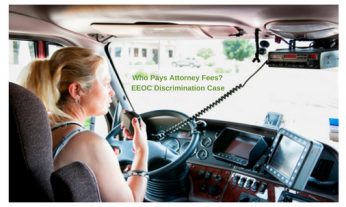 New Supreme Court ruling is a boon to employers hoping to collect attorney’s fees in an EEOC discrimination case. If your company is dealing with an EEOC complaint, you will most likely find the Supreme Court’s recent decision in CRST Van Expedited, Inc. v. Equal Employment Opportunity Commission to be welcome news. The case involved a ruling by the U.S. Court of Appeals for the Eighth Circuit, which held that a defendant in a Title VII case (such as an employer) is only entitled to payment for its attorney’s fees if it prevails in court after a “ruling on the merits.” The Supreme Court overturned this decision, and held that it is possible for a defendant to prevail and receive compensation for attorney’s fees, even without a ruling on the merits.
New Supreme Court ruling is a boon to employers hoping to collect attorney’s fees in an EEOC discrimination case. If your company is dealing with an EEOC complaint, you will most likely find the Supreme Court’s recent decision in CRST Van Expedited, Inc. v. Equal Employment Opportunity Commission to be welcome news. The case involved a ruling by the U.S. Court of Appeals for the Eighth Circuit, which held that a defendant in a Title VII case (such as an employer) is only entitled to payment for its attorney’s fees if it prevails in court after a “ruling on the merits.” The Supreme Court overturned this decision, and held that it is possible for a defendant to prevail and receive compensation for attorney’s fees, even without a ruling on the merits.
EEOC Discrimination Case Background
CRST’s EEOC discrimination case legal battle (which has lasted for over a decade) began when an employee named Monika Starke filed a complaint with the EEOC in 2005. She alleged that, over the course of her training as a truck driver, she was sexually harassed by two of her trainers. CRST denied the allegations. When the EEOC investigated, it discovered that four other employees had filed complaints. The EEOC ultimately found that there was reasonable cause to believe that an entire class of employees had been subjected to sexual harassment, and filed a lawsuit against CRST under Title VII on behalf of the aggrieved employees.
The EEOC eventually named more than 250 female employees of CRST as victims of sexual harassment. At trial, the District Court found that the EEOC had not satisfied its presuit requirements, and barred the EEOC from seeking relief for any of the employees. When CRST requested compensation for its EEOC discrimination case legal fees, the District Court approved the motion, and awarded CRST over $4 million in attorney’s fees.
An appeal, the Eighth Circuit found that CRST should not receive compensation for attorney’s fees. It reasoned that, due to precedent, only “prevailing” parties can receive compensation for attorney’s fees, and a party can only prevail if there has been a judicial determination of the plaintiff’s case on the merits. Because some of the complaints were thrown out due to the EEOC’s handling of the presuit requirements, the Court found that there had not been a ruling on the merits. According to the Court, there is a distinction between a ruling based on the elements of a claim (which would constitute a determination on the merits), and a ruling based on prerequisites to filing suit.
The Supreme Court disagreed, and held that there should be no requirement that a case be resolved “on the merits” in order for the defendant to be awarded attorney’s fees. According to the Court’s ruling, common sense dictates that a defendant has prevailed whenever a plaintiff’s claim has been rejected. The Court vacated the Eighth Circuit’s ruling, remanded the case for further proceedings, and urged the lower courts to expedite the resolution because the dispute has already taken so much time.
Would You Like to Know More About How This Ruling Could Affect Your EEOC Discrimination Case Complaint Proceedings?
If you have any questions about any EEOC matters involving you or your company, you can call or email the Santa Rosa office of the employment and labor law attorneys at Beck Law P.C. in Santa Rosa.
BECK LAW P.C. – SANTA ROSA – PETALUMA – UKIAH – LAKE COUNTY
